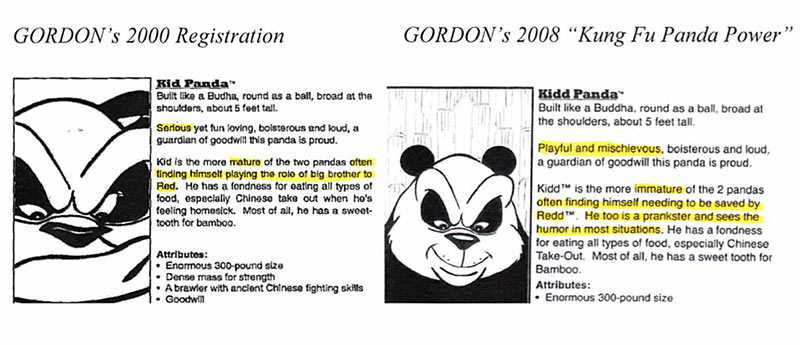

Cartoonist Faces Up To 25 Years in Prison For Failed ‘Kung Fu Panda’ Lawsuit
A federal grand jury indicted amateur cartoonist Jayme Gordon, 51, on December 16, 2015, alleging seven counts of wire fraud and perjury relating to a lawsuit Gordon had filed in 2011 against DreamWorks Animation.
Gordon had claimed that DreamWorks based its 2008 animated feature Kung Fu Panda on his Kung Fu Panda Power pitch, which he claimed to have submitted to DreamWorks previously. He abruptly withdrew his lawsuit in 2013 after DreamWorks attorneys confronted him with evidence he had traced his drawings from a 1996 Disney Lion King coloring book.
In 1999 and 2000, Gordon registered hundreds of pages of material with the U.S Copyright Office, including a series of drawings and stories entitled Jamie GORDON’s Panda Power, featuring a giant panda named “Kid,” and a little red panda named “Red.” The materials submitted for copyright describe Kid as “serious,” “mature,” and a sort of “big brother” to Red, who is described as “playful,” “mischievous,” and “the more immature” of the two characters.
According to the indictment, Gordon saw a trailer for Kung Fu Panda in early 2008. Gordon then revised his Panda Power drawings and registered them as Kung Fu Panda Power with the Copyright Office in May 2008, prior to the June 2008 release of DreamWorks’ animated feature.
The revisions Gordon made included removing Kid’s mask and medallion and instead depicting Kid in a rope belt and shorts, like the animated film’s lead, Po; descriptions of Kid as “the more immature of the 2 pandas;” and illustrations of Red with more white on his face, to make him look older, like the DreamWorks character Master Shifu. In Kung Fu Panda, the giant panda Po, voiced by comic star Jack Black, is the less mature, accident-prone character, whereas the red panda, Shifu, is the stern kung fu master, voiced by Hollywood elder statesman Dustin Hoffman.

In February 2011, Gordon filed a copyright infringement suit against DreamWorks in the U.S. District Court for the District of Massachusetts. In July 2011, Gordon’s attorneys emailed DreamWorks’ counsel, offering to settle for $12 million and half a percentage royalty on all future Kung Fu Panda sales revenue. One of Gordon’s “expert” witnesses even claimed Gordon had suffered damages of more than $150 million.
During discovery related to the lawsuit, DreamWorks’ attorneys unearthed evidence that on April 10, 2012 Gordon had deliberately erased computer files holding material related to the lawsuit. In fact, Gordon installed and used a program called Permanent Eraser to remove the files, and then deleted Permanent Eraser itself on April 13, 2012.
An expert witness for DreamWorks then pointed out to them that illustrations of Gordon’s pandas that were ostensibly dated 1992 and 1994 were in fact copied from a Disney coloring book that was not released until 1996. DreamWorks concluded that Gordon had backdated the drawings to try to strengthen his copyright claims against DreamWorks.
Then, in a deposition related to that lawsuit, Gordon claimed his illustrations were original and that he did not “directly take elements” from other works, that his drawings were dated 1992 because that was when he drew them, and that he had not changed his characters in any way since he had created them in the early 1990s.

The Cybercrime Unit of the U.S. Attorney’s Office in Boston will now prosecute Gordon, alleging that, when his attorneys sent four emails on his behalf related to the lawsuit, including requests for discovery and a settlement proposal, Gordon “did knowingly transmit…by means of wire communication in interstate commerce, writings…for the purpose of executing” his fraudulent scheme, and that by knowingly lying under oath he committed perjury.
“Our intellectual property laws are designed to protect creative artists, not defraud them,” said U.S. Attorney Carmen M. Ortiz. “The misuse of civil litigation as part of a fraud scheme, and lying under oath, as alleged in this case, warp our federal judicial system and must be addressed with appropriate criminal sanctions.”
For the charges of wire fraud and perjury, Gordon faces up to 25 years in prison, six years of supervised release, and fines up to $500,000 plus restitution to DreamWorks. The FBI pointed out in its press release that actual sentences for federal crimes are typically less than the maximum penalties. According to the federal indictment, DreamWorks spent approximately $1 million to defend the lawsuit, and another $2 million was spent by its insurance company.
The Boston Cybercrime Unit is famously aggressive in prosecuting alleged violations of U.S intellectual property law, most notably its controversial prosecution of software developer, Internet activist, and Reddit pioneer Aaron Swartz for wire fraud and violations of the Computer Fraud and Abuse Act. Swartz committed suicide in 2013 after prosecutors rejected a plea bargain offer made by Swartz.

.png)